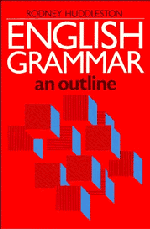Book contents
- Frontmatter
- Contents
- Preface
- Symbols and notational convention
- 1 Preliminaries
- 2 The parts of speech: a preliminary outline
- 3 Verbs
- 4 The structure of kernel clauses
- 5 Tense, aspect and modality
- 6 Nouns and noun phrases
- 7 Adjectives, determinatives and numerals
- 8 Adverbs and prepositions
- 9 Clause type
- 10 Negation
- 11 The subordination of clauses
- 12 Thematic systems of the clause
- 13 Coordination
- Further reading
- Index
3 - Verbs
Published online by Cambridge University Press: 05 June 2012
- Frontmatter
- Contents
- Preface
- Symbols and notational convention
- 1 Preliminaries
- 2 The parts of speech: a preliminary outline
- 3 Verbs
- 4 The structure of kernel clauses
- 5 Tense, aspect and modality
- 6 Nouns and noun phrases
- 7 Adjectives, determinatives and numerals
- 8 Adverbs and prepositions
- 9 Clause type
- 10 Negation
- 11 The subordination of clauses
- 12 Thematic systems of the clause
- 13 Coordination
- Further reading
- Index
Summary
General definition
At the general level, ‘verb’ is applied to a grammatically distinct word class in a language having the following properties:
(a) It contains amongst its most central members the morphologically simplest words denoting actions, processes or events; in predications of these types at least, the word functioning as head of the predicate expression will normally belong to the class we call verb.
(b) Members of the class carry inflections of tense, aspect and mood if the language has these as inflectional categories.
Reference to morphological complexity is needed in (a) because we find countless verb/noun pairs denoting the same action, etc. – cf. the earlier example of destroy/destruction: what we are saying in (a) is that with such examples the noun will normally be derived from the verb rather than the other way round. Compare also pairs like catchv/catchN, where on semantic grounds we take the verb to be more basic. Many verbs in English and other languages denote states (cf. know, like, etc.) and traditional definitions of the verb generally use some such formula as ‘action or state’; given the concept of general definition that we have introduced, however, it is better to omit states: ‘state’ will figure, rather, in the general definition of adjectives, for with verbs there are more words denoting actions, processes, events than states, whereas with adjectives the situation is very much the reverse.
- Type
- Chapter
- Information
- English GrammarAn Outline, pp. 37 - 48Publisher: Cambridge University PressPrint publication year: 1988



